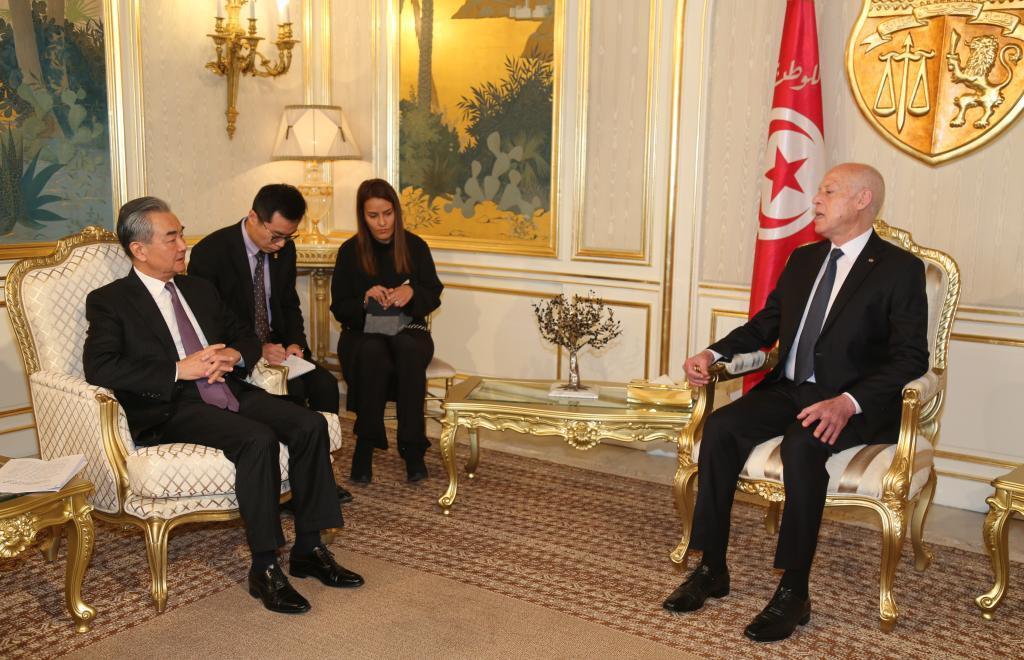Tunisia, China oppose interference in internal affairs under pretext of human rights

Tunisian President Kais Saied (1st R) meets with visiting Chinese Foreign Minister Wang Yi (1st L), also a member of the Political Bureau of the Communist Party of China Central Committee, in Tunis, Tunisia, Jan. 15, 2024. [Photo by Huang Ling/Xinhua]
TUNIS, Jan. 16 (Xinhua) -- Tunisian President Kais Saied and visiting Chinese Foreign Minister Wang Yi on Monday expressed opposition to interference in other countries' internal affairs under the pretext of human rights and democracy.
During their talks, Saied voiced great appreciation for Chinese President Xi Jinping's philosophy of governance, commending China's great achievements in promoting modernization, the 60 years of development of Tunisia-China relations and the fruitful results of pragmatic cooperation.
"Although Tunisia and China are far apart, our friendship is strong and our people are close to each other," Saied said, expressing thanks for China's long-term and valuable support in helping Tunisia to develop and improve people's lives.
He said that Tunisia will continue to actively participate in the Belt and Road Initiative, learn from China's successful experience, and promote modernization with Tunisian characteristics.
Tunisia will uphold the one-China principle, abide by UN General Assembly Resolution 2758, and support China in exercising sovereignty over all its territory, he said.
For his part, Wang, also a member of the Political Bureau of the Communist Party of China Central Committee, said that since the establishment of diplomatic relations between China and Tunisia 60 years ago, bilateral ties have stood the test of an evolving international landscape, and have maintained healthy and stable development. The most important experience is that the two countries have trusted each other and carried out mutually beneficial cooperation based on mutual trust and equal treatment.
The heads of state of the two countries have lately exchanged congratulatory messages, charting the course of the development of bilateral ties, said Wang, thanking Tunisia for its support on issues involving China's core interests and major concerns.
China also firmly supports Tunisia in safeguarding sovereignty, independence and national dignity, exploring a development path in line with its own national conditions, and independently advancing the national reform process.
"We stand ready to consolidate political mutual trust between the two sides, deepen cooperation in various fields, accelerate respective development and revitalization," he said.
The world today is afflicted with uncertainty and instability as well as rampant unilateralism, power politics and hegemony, said Wang, noting that China opposes the imposition of one's own values, opposes the transformation of other countries according to one's own standards, and opposes the interference in other countries' internal affairs under the pretext of human rights and democracy.
China is willing to strengthen unity and coordination with Tunisia to jointly implement the Global Development Initiative, Global Security Initiative and Global Civilization Initiative, to promote economic globalization featuring equal, orderly global multipolarity and inclusiveness.
Saied said that the history of colonialism cannot be repeated and the world cannot return to unipolar hegemony. Tunisia opposes double standards and interference in other countries' internal affairs under the banner of democracy and human rights.
"The series of important global initiatives proposed by President Xi demonstrate China's cultural heritage and global vision," Saied said, expressing willingness to work with China and other developing countries to safeguard common values of mankind, defend international fairness and justice, and build a community with a shared future.
The two sides also exchanged views on the Palestinian-Israeli conflict and other issues.
Also on Monday, Wang held talks with Tunisian Foreign Minister Nabil Ammar.


